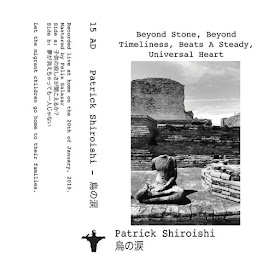Saturday, April 06, 2019
Patrick Shiroishi - 烏の涙\ (American Damage)
My previous exposure to Shiroishi's work, very limited, was as a saxophonist but on this cassette release, he evinces substantial guitar skills, as well as vocals. The title seems to translate to 'Tears of the Rose' and the text, both spoken and gently sung in Japanese, is by label owner Jordan Reyes. Shiroishi's guitar playing ranges easily from the early koto-esque strums at the beginning of the first track, to "traditional" sounds that recall, perhaps, Robbie Basho, to post-Bailey explorations, smoothly flowing from one to another, always excellently played. The two pieces, each just over ten minutes long, stream along, fracture, coalesce again, fracture again. The second ends with a few minutes of simple, heartfelt singing and playing, pure and beautiful. A very fine set.
American Damage
piv-ots - orangish (Nomad Exquisite)
piv-ots is Nicholas Burrage and I believe this is his first release in quite some time. Also, if my memory serves, the music presented here is in line with what I'd heard previously, which is to say electronic drones that are "simple" in one respect, but pared down with perfectly chosen elements, so "simple" in the sense that a fine bowl of soba noodles is simple, i.e., not really. 'the pond', the brief opening track, has a saw-like character, pulsing in place, rotating, bristling with energy. 'truss' begins with a set of deep, burred tones that recall the title track from 'Big Science'. They remain more or less in place as they're overlaid by the kind of loopy, spacey synth lines that should, by all rights, sound trite but manage to fit right in--baffling! :-) Near the end, Burrage adds some percussive sounds that dreamily evoke West African balafon playing--lovely. After a rather short--six seconds--respite of two muffled voices, we get to the last track, 'March 6, 2019'. The 23-minute piece is an excellent example of creating a basic ground--here a slowly pulsing, tonal hum--allowing it to vary moderately, almost unnoticeably, over its course, adding discreet but apposite flavorings along the way, not too many, just a handful, letting things simmer and flow. Excellent work, dronage the way it should be.
Nomad Exquisite
Michaël Attias - échos la nuit (Out of Your Head)
I was previously unfamiliar with Attias' work as an alto saxophonist who has recorded with, among others, Anthony Coleman, Anthony Braxton, Paul Motian and Jim Pugliese. If this solo recording is indicative, he's a very attractive player, with a calm approach that, of I had to make a comparison, sometimes reminds me of Braxton's quieter, more balladic, solo performances--but quieter and gentler still, only rarely venturing into flurries of overtones or extended techniques (some fine circular breathing on the aptly titled, 'Circles'). I said "solo", but on a number of the twelve tracks here, Attias overdubs himself on piano [correction: these aren't overdubs. Attias plays alto with one hand, piano with the other, in real time]. As with his alto, the piano is quiet and spare but always melodic, perhaps with a tinge of Paul Bley. When the piano is used, it's complementing the alto line, playing a written part, very delicate and touching, a ghostly echo, as it were. Very thoughtful, sensitive work from Attias, a pleasure to hear.
Out Of Your Head
Dušica Cajlan-Wissel/Etienne Nillesen/Georg Wissel - fourtyfour fiftythree (Creative Sources)
An improv session from Cajlan-Wissel (prepared piano), Nillesen (extended snare drum) and Wissel (prepared alto saxophone), all musicians new to me. Two suite-like sets, divided by time markings into sections. The trio's playing is active, skittery, tending toward the higher, thinner registers. The busy scurrying will on occasion coalesce into small explosions, subside back into--not silence, but a different form of quieter seething. They perform very well in a group sense, no pyrotechnics, no individual leaving the others behind. In fact, it's hard to get a real sense of the individuality of any of them, which isn't a bad thing (though Cajlan-Wissel has a few moments of deep melodicism that stand apart a little bit). As is often the case in this "area" of improvisation, the abundance of virtually non-stop sound-making turns out not to be entirely my thing; I still prefer more reticent listening and then--maybe--acting. But it's also a far cry from much in the jazz-based free improv world and listeners attuned to this subtler, more thoughtful side of things could find much to enjoy.
Creative Sources




No comments:
Post a Comment